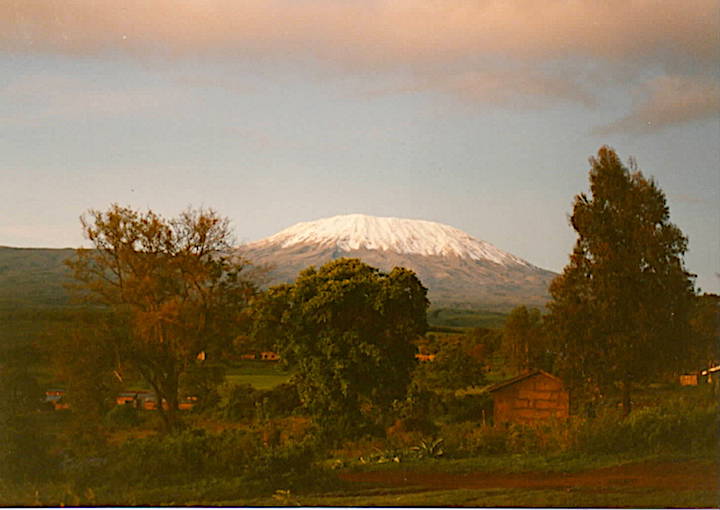 The group “By Invitation Only” has chosen Unity for today’s theme. I had planned to write about a few of the many successes of the European Union, but something came up that struck near to my heart. So bear with me.
The group “By Invitation Only” has chosen Unity for today’s theme. I had planned to write about a few of the many successes of the European Union, but something came up that struck near to my heart. So bear with me.
 When my kid was in preschool, the extraordinary teacher, Mme. L., decided to structure the year as a trip around the world. All the lessons—learning the alphabet, colors, counting—would relate to different countries. Some parents thought it was too much for four-year-olds to learn geography and concepts about other cultures when they should be getting drilled on writing S and E in the correct direction. Maybe even learning how to add. But Mme. L. persisted.
When my kid was in preschool, the extraordinary teacher, Mme. L., decided to structure the year as a trip around the world. All the lessons—learning the alphabet, colors, counting—would relate to different countries. Some parents thought it was too much for four-year-olds to learn geography and concepts about other cultures when they should be getting drilled on writing S and E in the correct direction. Maybe even learning how to add. But Mme. L. persisted.
The children made “passports.” They “visited” China, India, Mexico, Senegal and the U.S., and they also talked about other countries. They learned songs, were read stories and ate food from those countries. They learned phrases in other languages. They made musical instruments and miniature houses of the countries’ style.
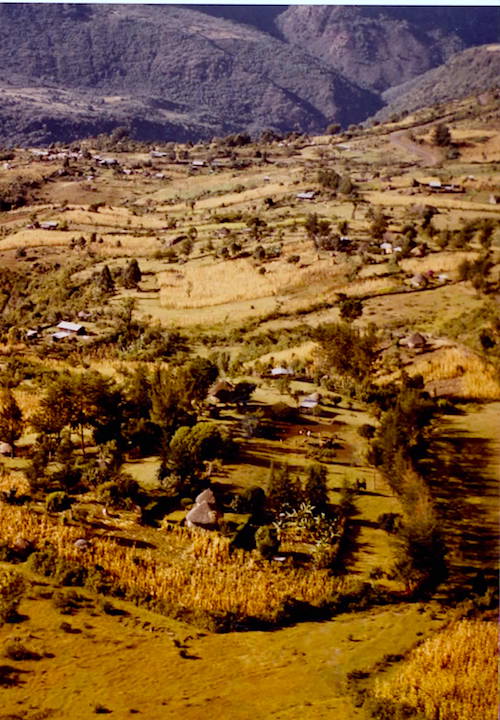
One day my kid came home with red clay all over. “We made huts today,” my kid explained, going on to describe how the clay walls kept the interiors cool in the warm climate. (BTW, a teacher friend informed me that young kids should always come home from school dirty, as it shows they did things and didn’t just sit like zombies at a desk.)
Mme. L. opened the world to these kids right at the moment when they were curious and not yet inculcated with negative stereotypes. Our village isn’t exactly diverse. Carcassonne is a little better, but it’s a sleepy town with no industry and limited economic opportunities.
One day, I was at a shopping center with my kid when a black man wearing a colorful, beautifully embellished robe walked by. My kid was curious: Which country do you think he’s from? Do you think he likes the weather? The food? Do you think he misses his country?
I was most struck by the fact that my kid’s reaction was not fear or rejection of someone different but interest. Also that my kid knew, at age four, that Africa was a continent with many countries, and that in those countries live individuals who might eat different food or live in different kinds of houses, but who are basically the same as us.
Another time, my kid, surveying the bounty of toys on the bedroom floor, declared gravely, “I am spoiled rotten. Some kids don’t even have one toy.”
Not everybody is lucky enough to have had a preschool teacher like Mme. L.
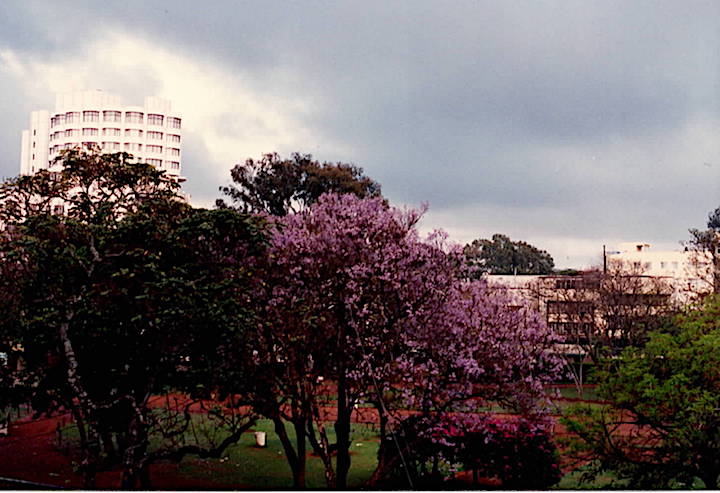
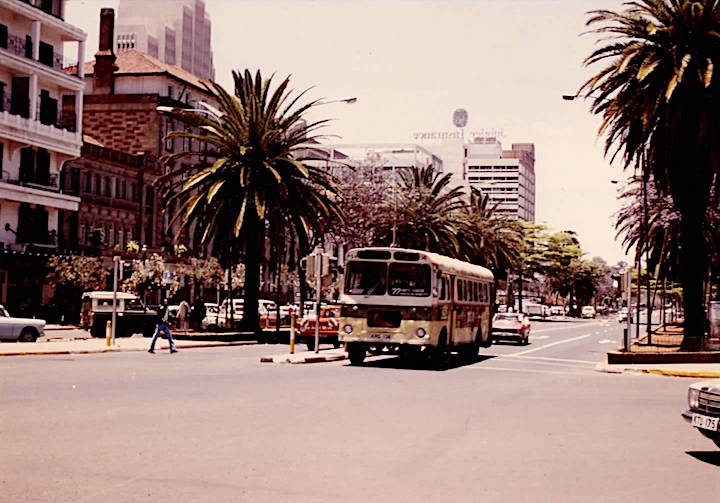
The title of this post is “Umoja,” which is “unity” in Swahili, the national language of Kenya and of Tanzania.
I have not been to all 54 countries in Africa, but I have visited five and lived in one. They were all beautiful, but beyond the natural beauty what I loved most was the beauty of the people, the culture. How many people have gone on safari and swooned over the animals while shunning the people?
I landed in Kenya in October 1985, as the drought that ravaged Ethiopia was still going strong. That was the famine that killed a million people and that inspired Michael Jackson to write “We Are the World,” which you can listen to here, and the lyrics are here. It’s time to read them again.
I saw many things in Kenya. Lions so close I could hear them crack the bones of the wildebeest they were feeding on. Giraffes grazing with cows. Majestic mountains (the top photo is of the Kibo peak of Mount Kilimanjaro, which is in Tanzania, right on the border). Exotic flowers. 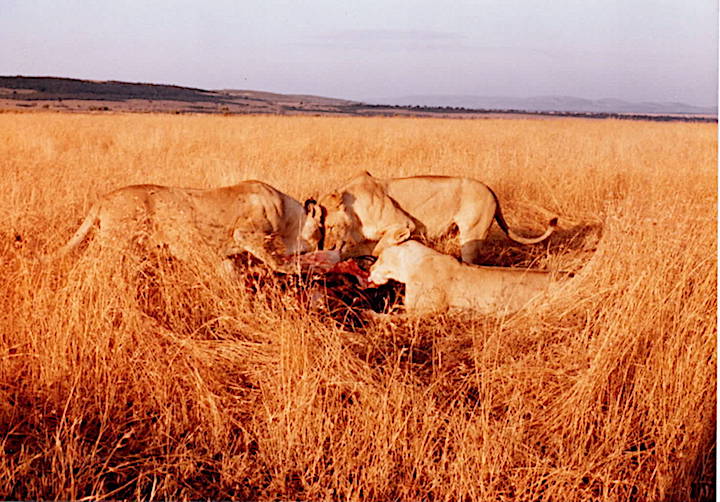
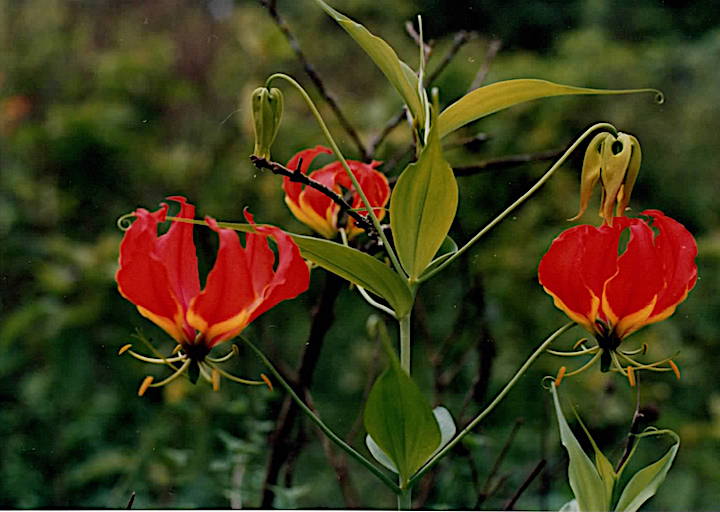 I saw incredibly hard-working people, many of whom did back-breaking labor for all 12 hours of sunlight. I saw very devout Christians who didn’t just attend church every Sunday in their best clothes but who walked the walk, taking care of each other though they themselves had so little. I saw very devout Muslims unloading sacks of cement at the port in hot and sticky Lamu, sweating profusely but not drinking a drop because it was Ramadan. I saw a culture where children were revered. Where education was paramount, worth every sacrifice.
I saw incredibly hard-working people, many of whom did back-breaking labor for all 12 hours of sunlight. I saw very devout Christians who didn’t just attend church every Sunday in their best clothes but who walked the walk, taking care of each other though they themselves had so little. I saw very devout Muslims unloading sacks of cement at the port in hot and sticky Lamu, sweating profusely but not drinking a drop because it was Ramadan. I saw a culture where children were revered. Where education was paramount, worth every sacrifice.
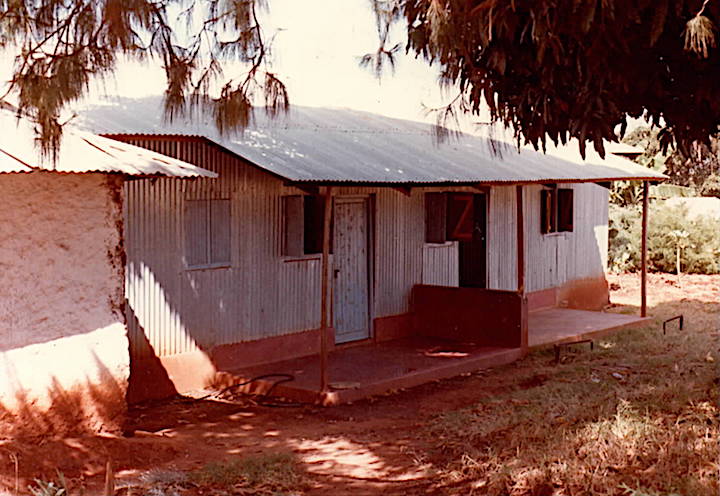
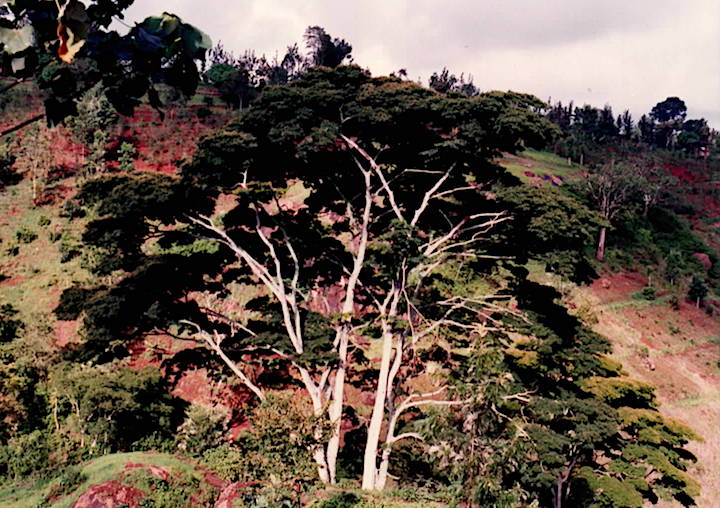
I also saw starving children, especially in the north, their empty stomachs distended, their hair orange from malnutrition, their energy too sapped to swat away flies from their faces. I saw their parents, in no better shape, working desperately to save them.
Once, when leaving “Hoggers,” a hamburger joint in Nairobi so devoted to America that it played tapes of a U.S. radio station, complete with the D.J.’s banter and weather and traffic reports between songs, I saw a young man, barely clothed, filthy, ravaging through the trash in the alley outside Hoggers, and stuffing jettisoned food into his mouth. That image will never leave me.
On a trip back many years later, taking the overnight train from Nairobi to Mombasa, I was booked into a sleeping car with two other women, both Kenyans. They were businesswomen; we were all about the same age, and we drank Tusker beer and talked about life. At that time, I was just visiting from New York; their lives and mine differed only in the details; the vast majority of our experiences were the same to an extent that startled me. Life is life. Around the world.

Every trip, I visited a former student. Her Christian name was Editor, which her mother, who didn’t speak English, had thought was pretty. Editor was always my favorite. Not my best student, but hard-working and honest and ambitious. She had a coffee and tea farm not far from where she’d grown up. Married, with two kids. She named her daughter after me.
Editor introduced me to her “big sister,” who wasn’t a blood relative at all but a mentor. In an area with no banks, women formed savings clubs, pooling their money and giving the pool to one member. The member would repay it and the pool would go to the next member. Often they would use it to buy a cow, which was not just a kind of savings account but which provided milk that could be consumed and sold, and each year would produce a calf, which also could be sold. Dividends, basically. New women would be brought in, sponsored by established members who were on the hook for their recruits’ repayment. As a result, the older women kept close tabs on their mentorees, helping them work through difficulties.
The “sister” also had two kids. She had a farm, as everybody did or tried to, because growing your own food means you won’t go hungry, whatever else may happen. She also had a job, and so did her husband, so they not only had a car but their house was made of bricks and had electricity and a TV. I lived for two years without electricity and I can attest that having it or not doesn’t make one a good or bad person, but it most certainly makes a person more efficient. The same with running water.
Over dinner, we talked and talked, and I kept thinking that they would have fit right in with my friends in my Midwestern hometown.

My school had about 450 kids. No electricity. No running water—they had to go to a stream at the foot of the hill to get it by the bucket (not easy because it wasn’t very deep). No glass in the windows. About 40 kids per class. Three kids sitting on two chairs at one desk with one book (yes, the poor middle kid had to straddle two chairs, but had the best view of the book). You could hear a pin drop in class–they were there to learn. It was a boarding school. They got up at 6, dressed into their uniforms, cleaned the classrooms (sweeping, then mopping not with mops but with buckets of water wiped up with big rags, on their hands and knees), studied, had breakfast (always a millet/sorghum porridge called uji). Then class. Lunch and dinner were always githeri, a maize-and-bean soup with vegetables, served with ugali (polenta). they got a little meat stew with potatoes or more ugali at lunch on Sundays. They had a little free time after school, spent doing sports or clubs like drama, and then studied again after dinner. There was one kerosene pressure lamp per classroom, and they arrayed their desks for a sliver of light.
I loved them. Even the naughty ones. Especially the good ones. They had many questions about the U.S. They thought it was hilarious that I would go jogging, bizarre that my hair was smooth and my feet soft and that it was crazy that there were people who did so little physical work and who had so much to eat that they had to exercise or they would be fat.
I had a bottle of fresh milk delivered every morning, still warm from the cow, with cream at the top. I had to use it all each day because I didn’t have a refrigerator (that electricity thing again). One day, next to my milk were a pair of flipflops I’d thrown away when the thong ripped a hole in the sole, so they wouldn’t stay on any more. They had been repaired, by hand, by the young man who delivered my milk. Such good flipflops shouldn’t be tossed because of such a small problem.
We’re spoiled rotten.
We know the price of everything and the value of nothing. We have such abundance that we are choking the planet with our waste. We are terrible stewards but we have the arrogance to tell everyone what to do.
With a little humility, we can see that we’re all in this life game together.
We are the world.

You can find the other contributions to “By Invitation Only” at Daily Plate of Crazy. Please read them all–very different approaches to the same topic.

Thank you for these impactful words– so needed in these troubling times!
Sent from my iPad
LikeLiked by 2 people
Thank YOU for reading.
LikeLike
What a poignant post today. Beautifully written, and an important message written with first-hand knowledge that so few of us possess. I have chastised you twice in comments for negative stereotypes re Americans. While there was some truth in them, I felt that they were contributing to the very thing so many people claim to have (i.e. tolerance) but fail to extend to everyone (e.g. Americans). Of course there will be peoples, and nations, who could heed your words more than others, but, your message today is a universal one. Thank you.
LikeLiked by 2 people
Thank you!
LikeLike
Thank you for the mindful post on unity.
What I had lost and then regained (after leaving the US) was first a sense of community and then to understand that everything is connected and therefore important.
LikeLiked by 3 people
Yes. We are indeed all connected. Sometimes we just don’t know it yet.
LikeLiked by 1 person
What a wonderful post, and what unforgettable experiences. Plus you were able to make a difference in people’s lives. I am an American living in Provence, and all I kept thinking of while reading is our shameful president calling these places “shithole countries”. I am so angry, and mortified, at what is going on there, and at the same time so proud of these people who work so hard and act with such kindness. Thank you so much for that.
bonnie near Carpentras
LikeLiked by 1 person
Well, obviously I don’t agree with his assessment. But I have been to several countries in Africa and he hasn’t.
LikeLiked by 1 person
He would only go if there was a good golf course …..
bonnie
LikeLiked by 1 person
Thank you. I have friends who have worked in and loved Africa, and years ago knew a woman from Nairobi who was instrumental in establishing a kind of micro-lending organization among local women. Your beautiful word-and-photo picture seems especially appropriate so near the day honoring Dr. King.
A universal message, indeed, as anthropologically speaking we are all Africans.
LikeLiked by 3 people
Thank you. It’s a gorgeous place.
LikeLike
Incredible experiences in Africa, and what a good teacher for your 4 year old boy. Learning about countries, culture and the people who live in so different parts of the worls is one of the important things of life.
I also believe we teach by how we act more than by what we actually say.
I will re read your post.
Sylvine
LikeLiked by 3 people
Thanks!
LikeLike
A lovely post. I had so many thoughts while reading your post. How did you end up in Africa? I loved that your child’s teacher pushed them beyond what we would consider their limitations. I wonder if we Americans will ever regain our reputation.
Oh, and our streets of our city in California are lined with those jacaranda trees. I always know spring has arrived when they start to bloom.
LikeLiked by 2 people
Before I moved to France I lived in San Diego. The Jacaranda trees line the streets there also. They are newcomers to Africa, being native to Mexico, Central and South America, and the Caribbean.
bonnie
LikeLiked by 1 person
There was a stretch of road with jacaranda trees on either side. When the flowers fell, it became a lavender-colored road. It was magical to pass through there.
LikeLiked by 1 person
I joined the Peace Corps. It was the best thing I ever did. I wouldn’t be in France today if I hadn’t gone off to Kenya first.
LikeLike
Thank you for expressing what I feel. There is too much hate and intolerance for people, places and cultures, some people do not even try to understand.
Opening one’s eyes,minds and hearts would do wonders for peaceful co-existence.
LikeLiked by 2 people
People often are afraid of what they don’t know. As Mark Twain said, “Travel is fatal to prejudice, bigotry, and narrow-mindedness, and many of our people need it sorely on these accounts.”
LikeLiked by 1 person
Wonderful post. We need more people like you to introduce us (Americans in particular) to Editor, Muriithi and other individuals of Africa. One can slam the door in the face of a stranger, but not in the face of someone you recognize.
LikeLiked by 2 people
Yes, Editor is one hard-working woman, who would do anything to help others.
LikeLike
Thank you for your wonderful words. While I’m writing this comment, a lot of very negative news alerts pop up on my iPad. The dichotomy is disturbing. I hope your post is reblogged many times.
Ali x
LikeLiked by 2 people
Thank you. I hope Africa gets the respect it deserves.
LikeLiked by 1 person
Very well said. Especially these days, with that lousy excuse for a human being in the Oval Office spewing his ignorance about the continent.
LikeLiked by 3 people
Let’s just say he has heard the wrong reviews.
LikeLike
Moving post today.
In my humble opinion, we should all take a step back and examine our own conspicuous consumption and establish how we, as individuals, can make decisions that will impact positively on others. All others.
LikeLiked by 2 people
It’s our laziness, really, to just buy rather than to repair. And our excesses–“I’ll take three” when one would do.
You are a great example of repairing and giving new life to things.
LikeLike
We try. In a minority though, I fear
LikeLiked by 1 person
The old New England mantra applies, I think, to many aspects of life, especially those involving purchases:
Use it up,
Wear it out,
Make it do,
Or do without.
LikeLiked by 1 person
Uh oh. My family is going to be hearing this one.
LikeLike
Thank you. Just, thank you.
LikeLiked by 1 person
Thank YOU.
LikeLike
A glorious post that brought me to tears this morning. You son has had at least two wonderful teachers: Mme. L. and you. I wish I could send this post to everyone I know.
LikeLiked by 1 person
Go ahead!
LikeLike
Thank you. That was a lovely post.
LikeLiked by 1 person
Thank YOU!
LikeLike
What an exquisite and vitally important piece of writing. I am humbled.
LikeLiked by 1 person
You know who humbles me? People like Editor, who never lose their smile, their willingness to help others, their hope that the future will be better for their children.
LikeLike
Indeed. 🙂
LikeLiked by 1 person
Oh WOW …. what a brilliant post on our BIO subject of Unity ….. I really enjoyed reading it and what a wonderful teacher. So lucky to have been taught like that and it must have made learning so interesting and enjoyable. XXXX
LikeLiked by 1 person
Yes, Mme. L. is an amazing teacher.
LikeLike
I so appreciate this entry. As a family (extended) we’ve recently been talking about the fact that we are ALL in this together and should behave accordingly, to see each other safely ‘home’.
LikeLike
This is a beautiful, beautiful post. Thanks you so much. Doreen
LikeLiked by 1 person
Thank you for reading!
LikeLike
This post was so inspirational! What a truly blessed and wonderful experience this must have been. I so enjoy (but also sad) the story of your time in Africa. I have learned much about the African people. I work with a large number from various countries. My co-workers are delightful people. I have learned so much from them. When I was reading, you described many of the qualities I have seen. What a joy it was to read this beautifully written piece. Thank you so much for sharing. I feel truly blessed.
LikeLiked by 1 person
The changes I have seen over the decades gives me a lot of hope, but there’s still great disparity. It IS getting better.
LikeLike
My sister-in-law has lived in South Africa, Zambia and now Botswana. I will share this article with her. She will love it. As I do. Your words should not fail to resonate with the masses.
LikeLiked by 1 person
Has she been to Nambia?
LikeLiked by 1 person
I’ll ask her.
LikeLiked by 1 person
Trick question! Nambia doesn’t exist, except in the mind of a certain reality-TV person.
LikeLiked by 1 person
Sorry, I thought you said Namibia 😀 Fooling aside, I think you would find her interesting company. She gave up a career in banking, sold her beautiful thatched cottage in Britain and all her belongings except for a few very personal treasures and moved to Africa to take up a post managing a game reserve. She has moved around for a variety of reasons but the letter she posted on FaceBook the other day from the Government of Botswana to the US Ambassador to the territory asking for clarification as to whether their country is a S&@%hole is worth checking out. She, in turn, will never return to supposedly more civilised parts. Her heart is truly African.
LikeLiked by 1 person
She sounds like an amazing person. You have quite the entourage!
LikeLiked by 1 person
🙂
LikeLiked by 1 person
Thank you for this fantastic post – great insights and inspirations!
LikeLiked by 1 person
Thank you!
LikeLiked by 1 person
I worked with lots of Ghanaians and Nigerians in London. I remember one of them telling me how difficult he found supporting his family back in Ghana in the manner they expected. They all knew how much he earned but he couldn’t convince them that the cost of living was such that he needed 90% of his wages just to pay his bills in London. He felt so guilty and conflicted.
LikeLiked by 1 person
And yet I bet they made great sacrifices in order to send a maximum amount back.
LikeLike
A beautiful and touching post. Three cheers for and blessings on your child’s preschool teacher — and on you as well. Thank you.
LikeLiked by 1 person
Mme. L. is a treasure.
LikeLike
Such a wonderful post! Brilliant example of what blogs, at their best, can offer us all. I particularly like that you speak back to a certain infamous comment made recently, and that you do so via the high road.
LikeLiked by 1 person
Clearly he was not well-informed about the reality on the ground in Africa.
LikeLike
WHAT A LIFE EXPERIENCE!I was lucky enough to do SEMESTER AT SEA which is college on a boat for a semester that travels around the WORLD…….
I got a TASTE of what your talking about here!
A REAL EYE OPENER……..
MERCI……..XX
LikeLiked by 1 person
Hmmm, that sounds like “The Suite Life on Deck,” which my kid used to love…..just kidding. Which countries did you go to?
LikeLike
Started in Florida………VENEZUELA,BRASIL,INDIA, Sri Lanka,AFRICA,MOMBASA and Cape Town,Hong Kong,Japan and came back to my home city of San Francisco!
LikeLiked by 1 person
That sounds like an amazing trip. No wonder you’re so cosmopolitan!
LikeLiked by 1 person
Wow. Really loved this post. What a privilege for your kid to have had such a creative teacher. We get so bent out of shape at the details of education that we often miss the big stuff. Like raising kind, creative, inquisitive kids.
And as a teacher yourself, what an experience to have taught in Africa. Wish I had done something similar when I was a young teacher.
Thanks for this.
LikeLiked by 1 person
Peace Corps in retirement?
LikeLike
My husband is living in a rehabilitation center and learning to walk again. His nurse’s name is Julius and he is from Kenya. He is the nicest and most compassionate nurse I have ever met and my husband adores him. We are blessed to know such a kind, human being.
LikeLiked by 1 person
My dad also had a number of nurses and aides from Africa. They were fantastic. I wrote about them last summer: https://francetaste.wordpress.com/2017/08/18/angels-in-our-midst
LikeLike
That post is my favorite post that you have ever written and I have many. There was something so beautiful about the way you wrote about how they cared for your dad in a home like setting. I have never been there but if I close my eyes I can smell the food they were cooking just remembering your words.
LikeLiked by 1 person
Thank you! It was a special place. I wrote to the CEO to praise the various workers by name.
LikeLike
Precisely why we NEED intelligent teachers for our children. Beautifully informed people who want to share the goodness of our Earth, not take a political stance on some point of view they hold.
LikeLike
Unfortunately ideas like “everybody is equal regardless of skin color or ethnicity” and “pollution is bad” have become political statements instead of common sense.
LikeLike
This is my second favorite post! This could be the first chapter of a book! Your words gave me goose bumps, and by the end I had tears in my eyes. WE do have too much, we do not appreciate it and we are so quick to tell everyone else what is wrong in their lives. Thank you for this reminder! Thank you for sharing your experiences.
LikeLiked by 1 person
Someone sent me a link to another article that was completely the opposite. Another Peace Corps volunteer in Africa, for whom the experience confirmed that only white Americans and Europeans are civilized. I was shocked that anybody could hold such hatred for other humans. It makes me worry for the future. The world would be better if we didn’t waste as much and if others had a bit more. Still rich and poor–they will always be with us–but there’s no need for such extremes.
LikeLike
What a beautiful post and yes my experiences with Kenyans and Nigerians have reflected your words. I do suggest that instead of concentrating on Americans conspicuous consumption that a dialogue be opened on the root cause of the poverty that so many countries suffer…..the dictators and their corrupt governments are well documented and should not be tolerated…..America and Americans are the most generous people and should be, but, it is time for a TRUE and UNBIASED assessment of where the money ends up!
LikeLiked by 1 person
The West has also propped up the dictators and has hurt the economies by charging high tariffs on their goods. Africa hasn’t enjoyed a level playing field in world trade. Definitely things need to change there, but the problems aren’t just African’s fault.
LikeLike
It’s really easy, honestly. The thing is, sometimes it can come out too dense/hard or kind of runny. The trick is mostly in the egg whites, to get them stiff but not to the point where they collapse. I included two links that show in pictures and videos how eggs whip up. The rest of it is just melting/mixing butter and chocolate and adding that to egg yolks and sugar. Then you put the chocolate flavoring with the egg white foam. Voilà! Even if it doesn’t turn out perfectly airy the first time, it will be tasty, and you will learn why the steps were explained the way they were. Or you might find a better way!
LikeLike
Argh! I thought you had replied to the Chocolate Mousse recipe! Sorry!
The situation about unity and respect for everybody is extremely difficult–the proof is that we still haven’t succeeded.
LikeLike
What a brilliant storyteller you are, and what incredible experiences of Africa you have shared. So grateful for educators and peacemakers like you.
LikeLiked by 1 person
Thank you. It was a great experience.
LikeLike
I just read your beautiful post. I must tell you it brought tears to my eyes. The people you introduced us to are so precious, honest, and grateful for their lives and one another. I felt shame as I have subconsciously been ambivalent about Africa. I see the documentaries and have read about the horrible suffering and my heart aches for them but reading about your personal interactions touched me deeply. I am so grateful for all God has given me, including the courage to say I have been ignorant and even superficial at times regarding the suffering and pain we see these precious souls enduring. It is as if it is so painful to see that it is easier to just pray for them and move on. But you reminded me that basically we are all hurting and yet capable of such joy. Like the precious little boy that danced for you every morning or the amazing students you pictured. Thank you for sharing your personal stories.
LikeLiked by 1 person
It is easy to objectify people who seem so different. The news photos show such hardship and make it difficult for us to connect with their humanity. It is good that you pray for them. If you want to do more, there are many hard-working charities; my school got library books, pigs (yes!) and money for water tanks and a science room. Or you can join the Peace Corps! (seriously–it’s my retirement plan.)
LikeLiked by 1 person